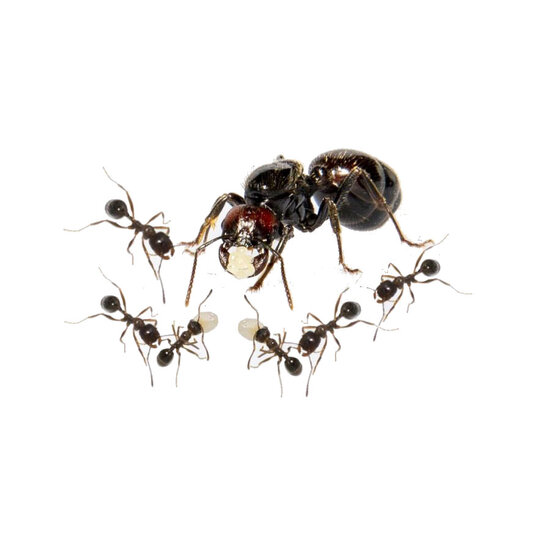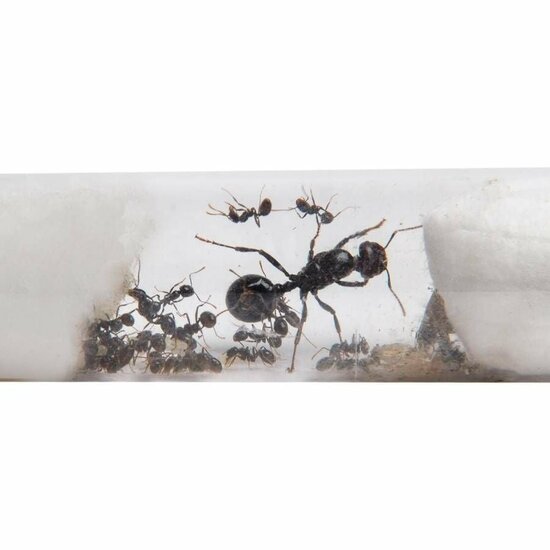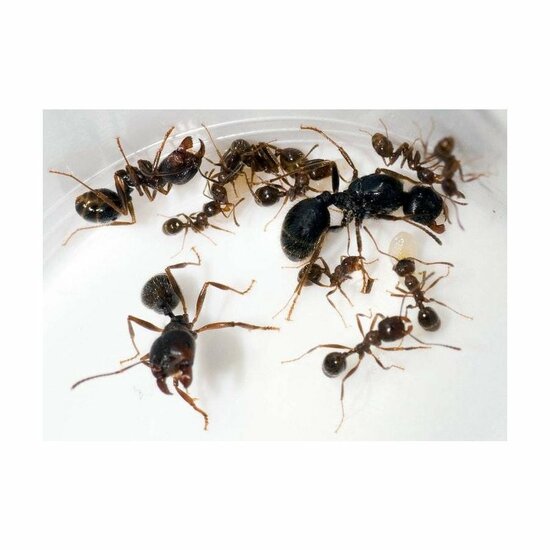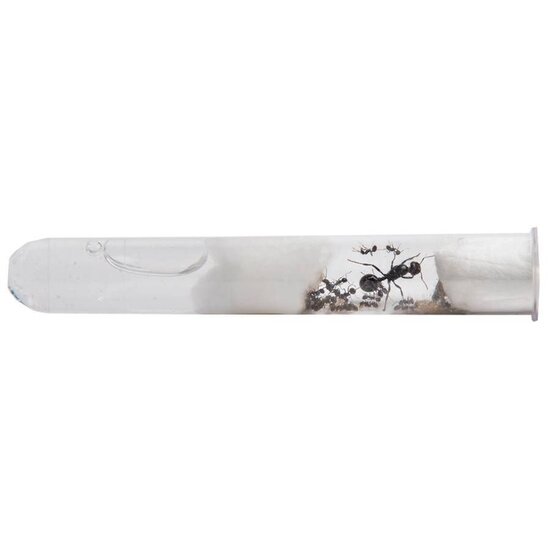







- Ants as pets since 2009 It starts here!
- We ship every working day until 4:30 PM
- Flat shipping costs from €6.99
- Specialists in ants, free advice
Do you have questions about this product?
Or do you need help? Please feel free to contact us, we are happy to help!
Product description
Ant colony Messor barbarus 50+ workers
Species introduction
The Messor barbarus species is also called the harvester ant because they are seed collectors and make nutrition out of their stock with seeds and cereals. These seeds and cereals they chew and mix them with saliva. This is the so called ant bread.
Our ant colonies consist of a queen with brood and several workers. This number depends on the number of eggs that developed into ant (egg-larva-pupa-ant). This colony has 500 or more workers and the workers are thus hatched by the queen ant itself.
Suitable for
The ant colony is intended for the ant farms of acrylic, gypsum and sand. We also recommend the use of an arena. The ants use the arena to get their nourishment and bring their garbage. Some of our products and offers have integrated an arena. For the first period of time the test tube has enough space for the colony. So they develop from the test tube.
On several Ant Farms You can find this ant colony in a special offer price. If you are looking for ants to use in a gel ant farm, we recommend the ant family.
Nutrition
the nutrition set above including seeds is a complete diet for this ant species. The set includes sugar water, honeydew, fruit flies and a starting kit with mixed seeds. The starting kit with seeds is enough for the first year.
Packing and Shipping
In the image you see how we actually supply the ant colony. The colony is in a test tube with a water supply in order to keep the tube nest partially damp. After receipt the colony can be kept in the tube up to a few weeks without any care. We give a 2 weeks warranty for the life of the queen. Does the queen arrive dead or if she dies within a few weeks, we will provide a replacement colony for free.
Specifications and information
Scientific name
Messor barbarus
Common used name
The harvest ant
Difficulty Class
1. beginner
Queen | Gyne:
14-18 mm
Workers:
3-14 mm
Type colony:
Monogyn, one queen per nest
Type of housing:
Sand Nests, relatively deep, often under stones
Temperature:
Room temperature, 15-30 degrees
Hibernation:
No, but a rest period. Our advice: slightly cooler with temperatures around 15 degrees during November-February. For example in the basement, a cooler attic or barn.
Our experience: even if you keep this species in winter on room temperature the ant colony will develop well.
Nutrition:
Seeds, sugar or honey water and small insects
Our advice for smaller colonies: fruit flies.
Humidity:
Our advice: Keep the nest part from your Ant Farm partially moisture.
Distribution:
Southern Europe
Ant Farm Advice:
Acrylic, gypsum or sand, including the use of an Arena
Comments:
- Messor barbarus is a common ant species from Southern Europe. You can find them in gardens, parks and forest areas. If you have patience you can breed and observe them in an Ant Farm. In most of the Ant Farms they grow into colonies with hundreds or a few thousand ants. And if you want your colony to become bigger, then of course you can always add extra housing parts.
They are particularly interesting because of their food (seeds). That is why they quickly need more space when the colony grows, to store the seeds. So compared to other ant species they can be kept in bigger housing ant farms more quickly.
- These species is also well known because of its larger Medior and Major workers. Larger ants that protect the colony have the job of a 'soldier ant'. How bigger the colony, how greater the difference in size of ants.
- On average Messor colonies develop faster than other species from Europe. In the Ant Farms you can grow them into colonies of hundreds or a few thousand ants in just a few years.
- Do you want your colony to become even bigger, then you can connect more housing parts.
- Messor barbarus is our favorite ant species ;-)
Ant colony Messor barbarus 50+ workers
Species introduction
The Messor barbarus species is also called the harvester ant because they are seed collectors and make nutrition out of their stock with seeds and cereals. These seeds and cereals they chew and mix them with saliva. This is the so called ant bread.
Our ant colonies consist of a queen with brood and several workers. This number depends on the number of eggs that developed into ant (egg-larva-pupa-ant). This colony has 500 or more workers and the workers are thus hatched by the queen ant itself.
Suitable for
The ant colony is intended for the ant farms of acrylic, gypsum and sand. We also recommend the use of an arena. The ants use the arena to get their nourishment and bring their garbage. Some of our products and offers have integrated an arena. For the first period of time the test tube has enough space for the colony. So they develop from the test tube.
On several Ant Farms You can find this ant colony in a special offer price. If you are looking for ants to use in a gel ant farm, we recommend the ant family.
Nutrition
the nutrition set above including seeds is a complete diet for this ant species. The set includes sugar water, honeydew, fruit flies and a starting kit with mixed seeds. The starting kit with seeds is enough for the first year.
Packing and Shipping
In the image you see how we actually supply the ant colony. The colony is in a test tube with a water supply in order to keep the tube nest partially damp. After receipt the colony can be kept in the tube up to a few weeks without any care. We give a 2 weeks warranty for the life of the queen. Does the queen arrive dead or if she dies within a few weeks, we will provide a replacement colony for free.
Specifications and information
| Scientific name | Messor barbarus |
| Common used name | The harvest ant |
| Difficulty Class | 1. beginner |
| Queen | Gyne: | 14-18 mm |
| Workers: | 3-14 mm |
| Type colony: | Monogyn, one queen per nest |
| Type of housing: | Sand Nests, relatively deep, often under stones |
| Temperature: | Room temperature, 15-30 degrees |
| Hibernation: | No, but a rest period. Our advice: slightly cooler with temperatures around 15 degrees during November-February. For example in the basement, a cooler attic or barn. Our experience: even if you keep this species in winter on room temperature the ant colony will develop well. |
| Nutrition: | Seeds, sugar or honey water and small insects Our advice for smaller colonies: fruit flies. |
| Humidity: | Our advice: Keep the nest part from your Ant Farm partially moisture. |
| Distribution: | Southern Europe |
| Ant Farm Advice: | Acrylic, gypsum or sand, including the use of an Arena |
| Comments: | - Messor barbarus is a common ant species from Southern Europe. You can find them in gardens, parks and forest areas. If you have patience you can breed and observe them in an Ant Farm. In most of the Ant Farms they grow into colonies with hundreds or a few thousand ants. And if you want your colony to become bigger, then of course you can always add extra housing parts. They are particularly interesting because of their food (seeds). That is why they quickly need more space when the colony grows, to store the seeds. So compared to other ant species they can be kept in bigger housing ant farms more quickly. - These species is also well known because of its larger Medior and Major workers. Larger ants that protect the colony have the job of a 'soldier ant'. How bigger the colony, how greater the difference in size of ants. - On average Messor colonies develop faster than other species from Europe. In the Ant Farms you can grow them into colonies of hundreds or a few thousand ants in just a few years. - Do you want your colony to become even bigger, then you can connect more housing parts. - Messor barbarus is our favorite ant species ;-) |
Reviews
No reviews yet
More information...
If you have any questions, please don't hesitate to contact us, we like it! You can reach us via email and WhatsApp. You are welcome in the showroom by appointment for advice and purchase!
Customer service Make an appointment
